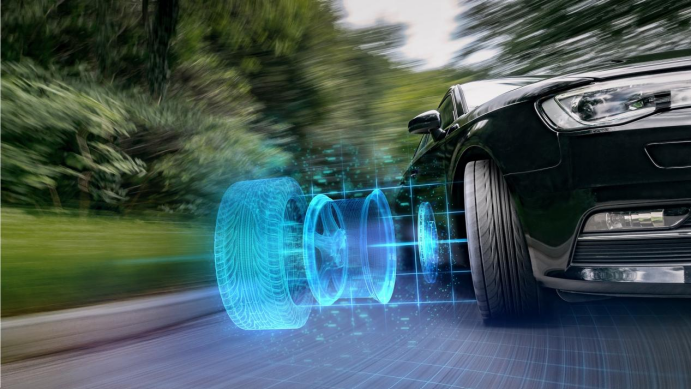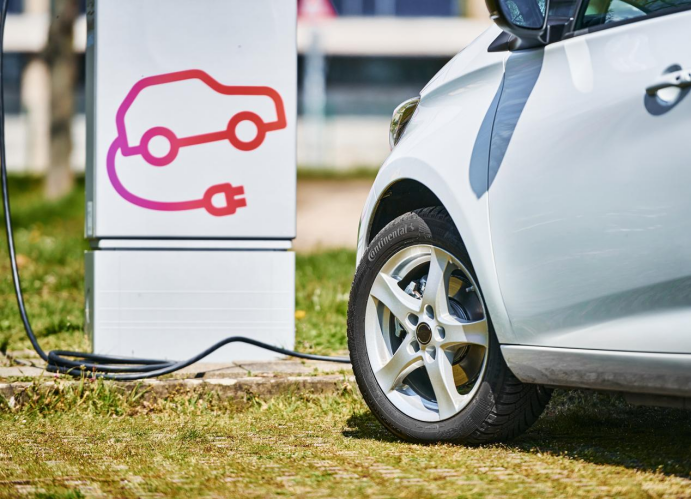|
|||||||||||||||||||||||
|
|||||||||||||||||||||||
 52
52
 2024-04-02
2024-04-02

Electric Vehicle Tires: Characteristics, Manufacturing, and Future Development Trends
With the rapid development and popularization of electric vehicle technology, tires, as one of its key components, are gradually receiving increasing attention. Electric vehicle tires not only bear the weight of the vehicle but
also directly affect the vehicle's handling, safety, and energy efficiency.

I. Special Features of Electric Vehicle Tires Compared to traditional fuel vehicle tires, electric vehicle tires exhibit unique characteristics in several aspects. These characteristics stem from not only the technical features of electric vehicles themselves but also the close relationship with modern road conditions and driving habits.
1. Ability to withstand weight and pressure Due to the large battery pack, electric vehicles are typically heavier than traditional fuel vehicles. This increased weight places higher demands on the tire's load-bearing capacity and pressure distribution. Tires need to withstand greater loads while maintaining stable performance to ensure safety and comfort during driving. Additionally, during high-speed driving and frequent acceleration, tires experience significantly increased pressure and friction. This necessitates tires with higher wear resistance and heat resistance to cope with the challenges of prolonged high-load operation.
2. Handling and stability requirements Electric vehicles generally have higher torque and initial acceleration, posing greater challenges for tire handling. Tires need to have good grip and responsiveness to ensure the vehicle can respond quickly and accurately to the driver's commands. Furthermore, tire design plays a crucial role in the vehicle's stability. Rational tire structure, tread design, and material selection can enhance the tire's friction with the ground, improve the vehicle's driving stability, and reduce the risk of skidding and loss of control.
3. Energy-saving and environmental protection requirements With the increasing emphasis on environmental protection, electric vehicle tires face growing demands for energy efficiency and environmental friendliness. The use of low rolling resistance tires has become a trend, reducing energy consumption during driving and improving the energy efficiency and range of electric vehicles. Moreover, the application of environmentally friendly materials in electric vehicle tires is becoming more widespread. These materials not only exhibit excellent performance but also reduce environmental pollution during manufacturing and use. For example, some tire manufacturers are starting to use renewable or bio-based materials to replace traditional petroleum-based materials, achieving sustainable tire development. In summary, the special features of electric vehicle tires mainly manifest in their ability to withstand weight and pressure, handling and stability requirements, as well as energy-saving and environmental protection requirements. These characteristics require thorough consideration of the actual needs of vehicles and market trends during the design and manufacturing of electric vehicle tires to meet modern drivers' expectations for safety, comfort, and environmental friendliness.
II. Materials and Manufacturing Processes of Electric Vehicle Tires The performance and quality of electric vehicle tires depend largely on the materials used and the manufacturing processes. With technological advancements, manufacturers are continuously exploring new materials and optimizing manufacturing processes to produce high-performance tires that meet the specific needs of electric vehicles.
1. Material selection
1.1 Characteristics of rubber materials and their application in tires Rubber is a core material in tire manufacturing, and its elasticity, wear resistance, and aging resistance directly impact the tire's service life and performance. In electric vehicle tires, the selection of rubber materials is particularly important. Natural rubber is widely used for its excellent elasticity and grip, while synthetic rubber, through formulation adjustments, can possess higher wear resistance, skid resistance, and lower rolling resistance to meet the specific requirements of electric vehicles.
1.2 Advantages of synthetic materials in tire manufacturing Synthetic materials play an increasingly important role in the manufacturing of electric vehicle tires. For example, the addition of polyester fibers and steel wires significantly enhances the structural strength and durability of tires. In addition, advanced nano-composite materials have been introduced into tire manufacturing, showcasing excellent mechanical properties and wear resistance to further improve tire performance and service life.
2. Manufacturing processes
2.1 Tire molding technology and vulcanization process Tire molding technology and the vulcanization process are critical factors affecting tire quality. Modern tire manufacturing utilizes advanced molding technology to ensure precise dimensions and stable structure of tires. The vulcanization process involves controlling temperature and pressure to fully cross-link rubber and synthetic materials, forming a strong and elastic tire structure. Optimization of these processes helps improve tire durability and safety.
2.2 Impact of tire tread design and manufacturing processes on performance Tire tread design is an important aspect of tire manufacturing, directly influencing the tire's grip, drainage performance, and noise levels. For electric vehicle tires, tread design needs to fully consider the impact of high torque and initial acceleration on tire performance, as well as the demand for low noise and environmental friendliness from electric vehicles. Through rational tread design and manufacturing processes, tire handling, comfort, and environmental performance can be significantly improved. In conclusion, the materials and manufacturing processes of electric vehicle tires constitute a complex and intricate process. By selecting appropriate materials and optimizing manufacturing processes, manufacturers can produce high-performance, reliable electric vehicle tires, providing strong support for the popularization and development of electric vehicles.
III. Performance Requirements of Electric Vehicle Tires As the sole contact point between the vehicle and the ground, the performance of electric vehicle tires directly relates to the vehicle's safety, comfort, and durability. To meet the specific requirements of electric vehicles, tires need to satisfy a series of strict performance requirements during the design and manufacturing process..
1. Safety Safety is the most basic and crucial performance requirement for electric vehicle tires. On wet and slippery roads, the tire's wet traction and skid resistance are particularly important. Excellent wet traction ensures stable grip even in rainy or wet conditions, preventing skidding or loss of control. Additionally, skid resistance is a key factor in ensuring driving safety, effectively reducing the risk of tire skidding during high-speed driving or emergency braking. In addition to wet performance, tire wear resistance and puncture resistance are also important manifestations of safety. Tires with good wear resistance can extend their service life, reducing performance degradation and safety hazards due to wear. Puncture resistance refers to the tire's ability to maintain structural stability and integrity under extreme conditions of high pressure or high temperature, preventing safety accidents caused by tire rupture or damage.
2. Comfort Comfort is another important aspect of electric vehicle tire performance requirements. Noise control of tires is crucial for enhancing driving and riding experiences. By using advanced noise control technologies and materials, tire noise during driving can be effectively reduced, creating a quieter and more comfortable environment for drivers and passengers. Furthermore, tire support for the vehicle's suspension system is a key factor affecting comfort. Excellent tire design can work in conjunction with the suspension system to absorb and cushion impacts and vibrations from uneven road surfaces, improving vehicle ride stability and passenger comfort.
3. Durability Durability is another important indicator of electric vehicle tire performance requirements. The tire's service life and replacement cycle directly relate to the vehicle's operating costs and maintenance convenience. By using high-quality materials and manufacturing processes, more durable, wear-resistant tires can be produced, extending their service life, reducing replacement frequency, and maintenance costs. Additionally, tire maintenance and care are essential to ensure durability. Regular inspection of tire pressure, wear, and damage, timely repairs, and replacements can maintain tire performance and safety. Furthermore, proper driving habits and road selection can reduce tire wear and damage, extending their service life. In summary, the performance requirements of electric vehicle tires cover multiple aspects, including safety, comfort, and durability. To meet these requirements, tire manufacturers need to continuously innovate and optimize design and manufacturing processes to provide higher quality and safer tire products, offering strong support for the popularization and development of electric vehicles.
IV. Performance Requirements of Electric Vehicle Tires As the sole contact point between the vehicle and the ground, the performance of electric vehicle tires directly relates to the vehicle's safety, comfort, and durability. To meet the specific requirements of electric vehicles, tires need to satisfy a series of strict performance requirements during the design and manufacturing process..
1. Application of new materials The research and application of new materials will bring revolutionary changes in enhancing the performance and reducing the cost of electric vehicle tires.
1.1 Potential of nanocomposite materials in tires Nanocomposite materials provide more durable and stable performance for electric vehicle tires due to their excellent mechanical properties and wear resistance. Nanotechnology allows different materials with varying properties to be combined at the nanoscale, comprehensively enhancing tire strength, elasticity, and wear resistance. With the further development of nanotechnology, we can expect to see more high-performance nanocomposite materials applied in the manufacturing of electric vehicle tires.
1.2 Exploration of renewable materials in tire manufacturing With the increasing awareness of environmental protection, the application of renewable materials in tire manufacturing is becoming more widespread. For example, bio-based materials and the recycling of waste rubber can serve as raw materials for tire manufacturing. These renewable materials not only have broad sources and low costs but also help reduce environmental pollution during the tire manufacturing process. In the future, with the continuous advancement of renewable material technology, we can expect to see the emergence of more environmentally friendly, high-performance electric vehicle tires.
2. Development of intelligent tires With the continuous development of technologies such as the Internet of Things and big data, intelligent tires are becoming a major trend in the field of electric vehicle tires.
2.1 Tire sensors and data monitoring By embedding sensors in tires, key parameters such as tire temperature, air pressure, and wear condition can be monitored in real time. These data can be wirelessly transmitted to the vehicle's control system or the driver's mobile application, helping drivers understand the tire's status in a timely manner and prevent potential safety hazards. Furthermore, this data can provide valuable research and development basis for tire manufacturers, promoting continuous improvement in tire performance.
2.2 Integration and collaboration of tires with vehicle systems In the future, intelligent tires will achieve closer integration and collaboration with vehicle systems. Through data interaction and collaborative work with vehicle control systems and autonomous driving systems, intelligent tires can adjust their own status in real time to adapt to different driving environments and requirements, enhancing vehicle handling, comfort, and safety. For example, during emergency braking or high-speed turns, intelligent tires can automatically adjust tire pressure and tread pattern to provide better grip and stability.
3. Implementation of green environmental concepts Throughout the future development of electric vehicle tires, the implementation of green environmental concepts will be consistent.
3.1 Environmental measures in the tire manufacturing process The tire manufacturing process generates a large amount of exhaust gas, wastewater, and solid waste, causing certain environmental pollution. In the future, tire manufacturers will pay more attention to implementing environmental protection measures, reducing environmental pollution and resource consumption in the tire manufacturing process through clean production processes, energy-saving technologies, and waste recycling.
3.2 Research and development of tire recycling and reuse technologies With the popularization of electric vehicles and the shortened replacement cycle of tires, the recycling and reutilization of old tires are becoming increasingly prominent issues. In the future, tire manufacturers will increase their efforts in the research and development of tire recycling and reuse technologies, exploring more efficient and environmentally friendly methods for handling old tires. For example, through chemical or physical methods, old tires can be decomposed into raw materials for reuse, or transformed into other valuable products, achieving the recycling of resources.
In summary, the future development trends of electric vehicle tires will continue to advance in the application of new materials, the development of intelligent tires, and the implementation of green environmental concepts. These innovations and developments will provide strong support for the improvement of electric vehicle tire performance, cost reduction, and environmental improvement, driving the sustained and healthy development of the electric vehicle industry.

The importance of electric vehicle tires cannot be overlooked. They are not only the sole contact point between electric vehicles and the road, but also directly affect the vehicle's driving performance, safety performance, and passenger comfort.
u Electric vehicle tires are crucial in ensuring driving performance. They need to have good grip, rolling resistance, and wear resistance to ensure the vehicle maintains stability and smoothness during acceleration, braking, and turning. High-quality tires can improve vehicle handling and responsiveness, making driving smoother and more agile.
u The safety performance of electric vehicle tires should not be ignored. They need to have good anti-skid performance and structural strength to prevent skidding or loss of control on wet and slippery roads or in emergency situations. Moreover, tires with strong wear resistance can extend their service life, reducing safety hazards resulting from tire damage.
u Electric vehicle tires directly impact passenger comfort. They can absorb and cushion impacts and vibrations from uneven road surfaces, providing a smoother and more comfortable riding experience for passengers. Tires with low noise levels can reduce noise disturbances during driving, further enhancing passenger comfort.
In conclusion, electric vehicle tires play a crucial role in ensuring driving performance, safety, and passenger comfort. Therefore, we should highly value the selection, maintenance, and replacement of electric vehicle tires, ensuring that they always remain in optimal condition to provide strong support for the safety, comfort, and efficient operation of electric vehicles.
With the continuous advancement and popularization of electric vehicle technology, electric vehicle tires, as a key component, will exhibit more diversified, intelligent, and environmentally friendly development trends in the future.
Firstly, the application of new materials will become a significant direction for the development of electric vehicle tires. New materials such as nanocomposite materials and bio-based materials will gradually replace traditional materials, enhancing tire performance and environmental friendliness. These new materials possess excellent mechanical properties and wear resistance, effectively improving tire grip and service life while reducing rolling resistance and enhancing the range of electric vehicles.
Secondly, intelligent tires will become a new highlight in the development of electric vehicle tires. By integrating sensors and data monitoring technologies, intelligent tires can monitor key parameters such as tire temperature, air pressure, and wear condition in real time, transmitting the data to the vehicle's control system or the driver's mobile application. Consequently, drivers can promptly understand the tire's status, prevent potential safety hazards, and enhance driving safety. Moreover, intelligent tires can collaborate with vehicle systems to achieve more accurate control and a more comfortable riding experience.
Additionally, environmental concepts will be deeply integrated into the future development of electric vehicle tires. Tire manufacturers will pay more attention to the selection of environmentally friendly materials and the improvement of production processes, reducing energy consumption and emissions during tire manufacturing. Meanwhile, the recycling and reuse of old tires will receive further development and promotion, achieving the circular use of resources and sustainable environmental development.
Finally, with the rapid development of autonomous driving technology, electric vehicle tires will achieve closer integration with autonomous driving systems. Tires will provide real-time road information and vehicle status to autonomous driving systems through sensors and data transmission technologies, helping autonomous driving systems make more accurate decisions and enhance driving safety and stability.
In summary, the future development of electric vehicle tires will achieve significant breakthroughs in the application of new materials, intelligent development, and the implementation of green environmental concepts. We look forward to these innovations and developments providing stronger support for the safety, comfort, and efficient operation of electric vehicles, driving the sustained and healthy development of the electric vehicle industry.

|